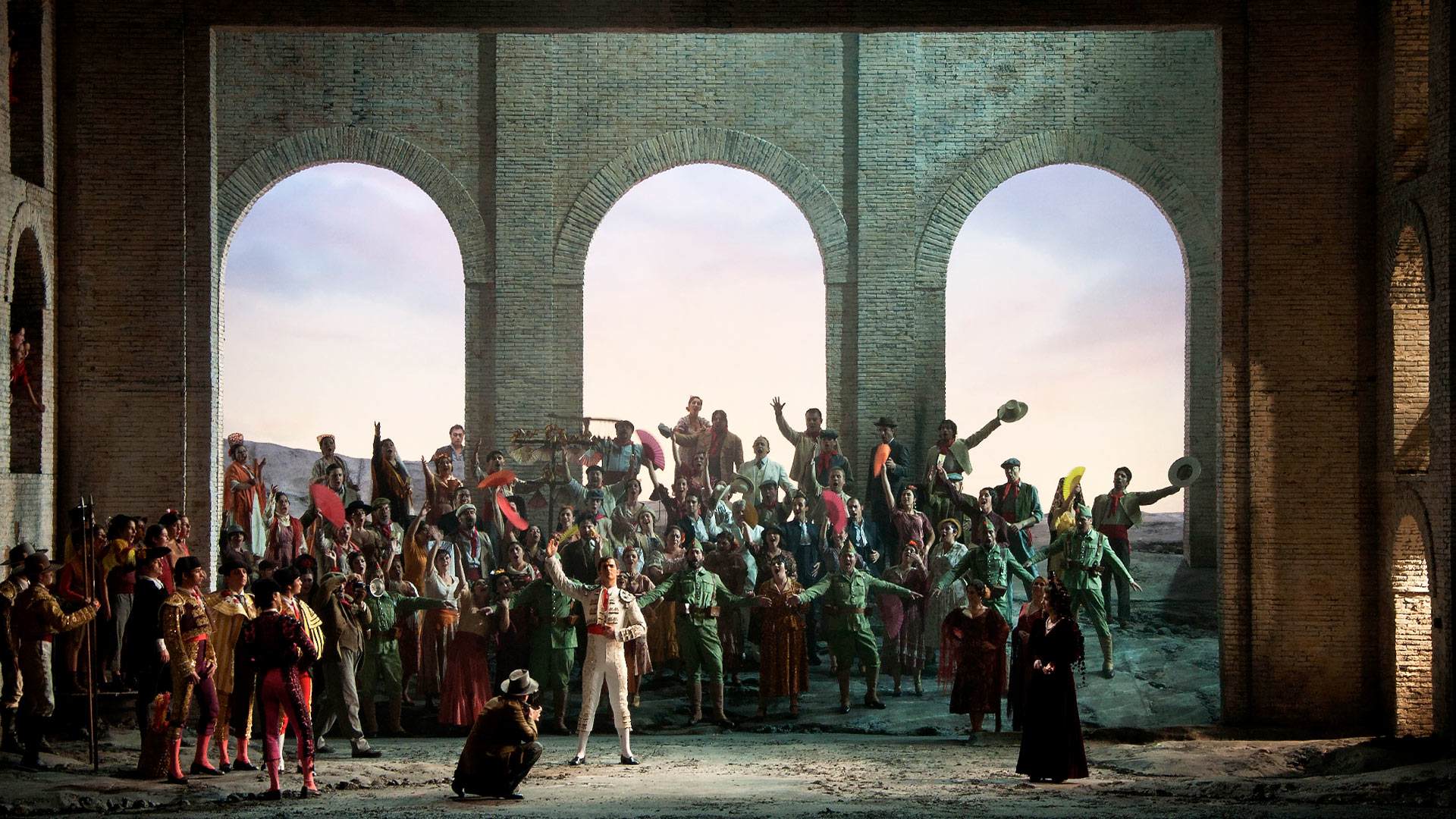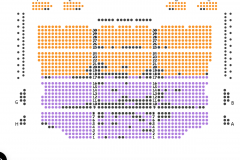Carmen
Mo | Tu | We | Th | Fr | Sa | Su |
Donato Renzetti conducts George Bizet’s opéra-comique, directed by Emilio Sagi
Opéra-comique in four acts by George Bizet, libretto by Henri Meilhac and Ludovic Halévy from the novella by Prosper Mérimée
Staging by the Fondazione Teatro dell’Opera di Roma
Carmen di George Bizet is an opéra-comique in four scenes to a libretto by Henri Meilhac and Ludovic Halévy from the 1845 novella of the same name by Prosper Mérimée. It was composed between 1874 and 1875 for the Opéra-Comique in Paris, where Bizet himself oversaw the preparation of the staging during the months of rehearsals, continuing to rework the score until its premiere on 3 March 1875. The production continued afterwards, and the composer produced a version without the canonical spoken/recited sections of the opéra-comique in view of a Viennese staging, where the genre was little frequented, replacing the spoken parts with recitatives. The 1877 edition, which is the most represented today, sticks to the ‘Viennese variant’. The adaptation of the novella saw several changes, including the introduction of the character of Micaela and the greater prominence given to the bullfighter Escamillo. The story takes place in Seville around 1820, where the soldier Don José is seduced by the gypsy girl Carmen, moving away from his world and closer to hers in a spiral of jealousy and lawlessness that will lead him to kill her and finally hand himself over to the gendarmes. The seductive power of the protagonist constitutes the fulcrum around which the other characters move, and will also be the reason for her tragic fate. Carmen is a free, voluptuous but determined heroine, deeply insubordinate to any imposition. Bizet uses various compositional devices that together make Carmen a decidedly up-to-date and contemporary opéra-comique, with references to the innovations of Verdi, Wagner and Italian verismo.
Synopsis
Place: Seville, Spain, and surrounding hills
Time: Around 1820
Act 1
A square, in Seville. On the right, a door to the tobacco factory. At the back, a bridge. On the left, a guardhouse.
A group of soldiers relax in the square, waiting for the changing of the guard and commenting on the passers-by ("Sur la place, chacun passe"). Micaëla appears, seeking José. Moralès tells her that "José is not yet on duty" and invites her to wait with them. She declines, saying she will return later. José arrives with the new guard, which is greeted and imitated by a crowd of urchins ("Avec la garde montante").
As the factory bell rings, the cigarette girls emerge and exchange banter with young men in the crowd ("La cloche a sonné"). Carmen enters and sings her provocative habanera on the untameable nature of love ("L'amour est un oiseau rebelle"). The men plead with her to choose a lover, and after some teasing she throws a flower to Don José, who thus far has been ignoring her but is now annoyed by her insolence.
As the women go back to the factory, Micaëla returns and gives José a letter and a kiss from his mother ("Parle-moi de ma mère!"). He reads that his mother wants him to return home and marry Micaëla, who retreats in shy embarrassment on learning this. Just as José declares that he is ready to heed his mother's wishes, the women stream from the factory in great agitation. Zuniga, the officer of the guard, learns that Carmen has attacked a woman with a knife. When challenged, Carmen answers with mocking defiance ("Tra la la ... Coupe-moi, brûle-moi"); Zuniga orders José to tie her hands while he prepares the prison warrant. Left alone with José, Carmen beguiles him with a seguidilla, in which she sings of a night of dancing and passion with her lover—whoever that may be—in Lillas Pastia's tavern. Confused yet mesmerised, José agrees to free her hands; as she is led away she pushes her escort to the ground and runs off laughing. José is arrested for dereliction of duty.
Act 2
Lillas Pastia's Inn
Two months have passed. Carmen and her friends Frasquita and Mercédès are entertaining Zuniga and other officers ("Les tringles des sistres tintaient") in Pastia's inn. Carmen is delighted to learn of José's release from two months' detention. Outside, a chorus and procession announces the arrival of the toreador Escamillo ("Vivat, vivat le Toréro"). Invited inside, he introduces himself with the "Toreador Song" ("Votre toast, je peux vous le rendre") and sets his sights on Carmen, who brushes him aside. Lillas Pastia hustles the crowds and the soldiers away.
When only Carmen, Frasquita and Mercédès remain, smugglers Dancaïre and Remendado arrive and reveal their plans to dispose of some recently acquired contraband ("Nous avons en tête une affaire"). Frasquita and Mercédès are keen to help them, but Carmen refuses, since she wishes to wait for José. After the smugglers leave, José arrives. Carmen treats him to a private exotic dance ("Je vais danser en votre honneur ... La la la"), but her song is joined by a distant bugle call from the barracks. When José says he must return to duty, she mocks him, and he answers by showing her the flower that she threw to him in the square ("La fleur que tu m'avais jetée"). Unconvinced, Carmen demands he show his love by leaving with her. José refuses to desert, but as he prepares to depart, Zuniga enters looking for Carmen. He and José fight. Carmen summons her gypsy comrades, who restrain Zuniga. Having attacked a superior officer, José now has no choice but to join Carmen and the smugglers ("Suis-nous à travers la campagne").
Act 3
A wild spot in the mountains
Carmen and José enter with the smugglers and their booty ("Écoute, écoute, compagnon"); Carmen has now become bored with José and tells him scornfully that he should go back to his mother. Frasquita and Mercédès amuse themselves by reading their fortunes from the cards; Carmen joins them and finds that the cards are foretelling her death, and José's. The smugglers depart to transport their goods while the women distract the local customs officers. José is left behind on guard duty.
Micaëla enters with a guide, seeking José and determined to rescue him from Carmen ("Je dis que rien ne m'épouvante"). On hearing a gunshot she hides in fear; it is José, who has fired at an intruder who proves to be Escamillo. José's pleasure at meeting the bullfighter turns to anger when Escamillo declares his infatuation with Carmen. The pair fight ("Je suis Escamillo, toréro de Grenade"), but are interrupted by the returning smugglers and girls ("Holà, holà José"). As Escamillo leaves he invites everyone to his next bullfight in Seville. Micaëla is discovered; at first, José will not leave with her despite Carmen's mockery, but he agrees to go when told that his mother is dying. He departs, vowing he will return. Escamillo is heard in the distance, singing the toreador's song.
Act 4
A square in Seville. At the back, the walls of an ancient amphitheatre
Zuniga, Frasquita and Mercédès are among the crowd awaiting the arrival of the bullfighters ("Les voici! Voici la quadrille!"). Escamillo enters with Carmen, and they express their mutual love ("Si tu m'aimes, Carmen"). As Escamillo goes into the arena, Frasquita and Mercédès warn Carmen that José is nearby, but Carmen is unafraid and willing to speak to him. Alone, she is confronted by the desperate José ("C'est toi!", "C'est moi!"). While he pleads vainly for her to return to him, cheers are heard from the arena. As José makes his last entreaty, Carmen contemptuously throws down the ring he gave her and attempts to enter the arena. He then stabs her, and as Escamillo is acclaimed by the crowds, Carmen dies. José kneels and sings "Ah! Carmen! ma Carmen adorée!"; as the crowd exits the arena, José confesses to killing Carmen.
Program and cast
Main characters and performers:
Don Josè: Piero Pretti; Amadi Lagha (17,24)
Escamillo: Luca Tittoto; Abramo Rosalen (17,24)
Le Dancaire: Saverio Fiore
Le Remendado: Armando Gabba
Morales: Paolo Ingrasciotta
Zuniga: Luca Dall’Amico
Carmen: Annalisa Stroppa; Caterina Piva (17,24)
Micaela: Giuliana Gianfaldoni; Angela Nisi (17,24)
Frasquita: Vittoriana De Amicis
Mercedes: Alessandra Della Croce
Maestro concertatore e direttore: Donato Renzetti
Director: Emilio Sagi
Scenes: Daniel Bianco
Costumes: Renata Schussheim
Choreographic movements: Nuria Castejón
Lighting: Eduardo Bravo
Orchestra, chorus, treble voices choir and technicians of the Opera Carlo Felice Genova
Choirmaster Claudio Marino Moretti
Chorus master Gino Tanasini
Carlo Felice Theater
Built on the area of Carlo Felice, the new theater, built by Aldo Rossi, recovers an idea already present in Paul Chessa projects and Carlo Scarpa: the creation of a piazza covered with 400 square meters, where the theater it was the ideal link between Galleria Mazzini and Piazza De Ferrari. Distant instead from an architectural point of view are the same Galleria Mazzini and the theater. the square is an open foyer; the walls are covered with stone slabs, and are enriched with columns and metal beams. There are two requirements that the architects wanted to keep in mind in the implementation of the new Carlo Felice theater: first, the need to rebuild it exactly where it was and secondly the desire to equip the new facility with the latest technology. From the latter need arises the imposing fly tower about 63 meters high. In practice the old theater work of Barabino remain the columns, the portico, the Latin inscription and the terrace that overlooks Via XXV Aprile which is accessed by one of the foyer; the current structure is very compact and geometric, the fly tower is a very linear in height developed rectangular, adorned only by a cornice.The auditorium, the foyer and services for the public are contained in a smaller box, where they emphasize the porch and the porch. As for the construction of the new theater are the stone were used for the exterior, plaster and iron, for the interior marble and wood. It is durable material that suggests an image of eternity, security and survival of the building over time. From the covered square, descending a staircase, you enter a room with a capacity of about 200 seats. Equipped with a small stage and independent from the rest of the theater, the hall hosts conferences, lectures and musical events. The interior of the theater entrance wide staircase leads to the closet and still climbing, the first foyer which has an area of 660 square meters and is decorated with frescoes and tapestries. the lantern A characteristic feature of the new Carlo Felice is the lantern visible in the foyer overlooking the lobby; it's a kind a light cone that runs through the building in all its height and it runs through all the plans, bringing the light from the roof to the indoor square. The tower Absolutely unique is the scenario in which they operate the technical units; right in the scenic tower, which houses the machine to move the shows, come together in a delicate balance human labor and sophisticated gear.In fact, the theater has four stages, a main stage, a back stage behind the first two stages and less aligned with each other and managed by integrated electronic and computerized. These scenic handling facilities, computerized lighting, sophisticated booths director for filming and acoustics among the best in Italy are among the features that make the Carlo Felice a factory of emotions among the most important in Italy.

 EN
EN DE
DE IT
IT FR
FR ES
ES RU
RU JP
JP RO
RO
 Seating plan
Seating plan 
